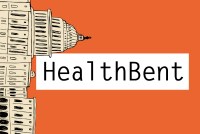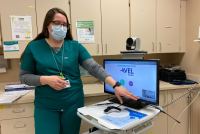Latest KFF Health News Stories
What the Health? From KFF Health News: A Health-Heavy State of the Union
President Joe Biden’s 2023 State of the Union address leaned heavily on health care issues. Biden took a victory lap for recent accomplishments like capping prescription drug costs for seniors on Medicare. He also urged Congress to make permanent the boosted premium subsidies under the Affordable Care Act, and he sparred with Republicans on threats to cut Social Security and Medicare. Also this week, both sides in the abortion debate are bracing for a court decision out of Texas that could, at least temporarily, make the abortion pill mifepristone illegal nationwide. Alice Miranda Ollstein of Politico, Rachel Cohrs of Stat, and Sarah Karlin-Smith of the Pink Sheet join KHN chief Washington correspondent Julie Rovner to discuss these issues and more. Also this week, Rovner interviews Kate Baicker of the University of Chicago about a possible middle ground in the effort to get universal health insurance coverage.
Community Resurrects Colorado Birth Center Closed by Private Equity Firm
A private equity firm bought a birth center and then shut it down. The community brought it back as a nonprofit.
What the Health? From KFF Health News: Au Revoir, Public Health Emergency
The Biden administration this week announced it would let the covid-19 public health emergency lapse on May 11, even as the Republican-led House was voting to immediately eliminate the special authorities of the so-called PHE. Meanwhile, anti-abortion forces are pressuring legislators to both tighten abortion restrictions and pay for every birth in the nation. Margot Sanger-Katz of The New York Times, Rachel Roubein of The Washington Post, and Victoria Knight of Axios join KHN’s chief Washington correspondent Julie Rovner to discuss these issues and more. Also this week, Rovner interviews Hannah Wesolowski of the National Alliance on Mental Illness about the rollout of the national 988 suicide prevention hotline.
A Baby Spent 36 Days in an In-Network NICU. Why Did the Hospital Next Door Send a Bill?
A baby spent more than a month in a Chicago NICU. A big bill revealed she was treated by out-of-network doctors from the children’s hospital next door. Her parents were charged despite a state law protecting patients from such out-of-network billing — and sent to collections when they didn’t pay up.
In Part II of this special two-part episode, Alice Miranda Ollstein of Politico, Sandhya Raman of CQ Roll Call, and Sarah Varney of KHN join KHN chief Washington correspondent Julie Rovner to discuss how the abortion debate has evolved since the Supreme Court overturned the nationwide right to abortion in 2022, and what might be the flashpoints for 2023. Also, for extra credit, the panelists recommend their most memorable reproductive health stories from the last year.
What the Health? From KFF Health News: Part I: The State of the Abortion Debate 50 Years After ‘Roe’
In Part I of this special two-part episode, Alice Miranda Ollstein of Politico, Sandhya Raman of CQ Roll Call, and Sarah Varney of KHN join KHN chief Washington correspondent Julie Rovner to discuss how the abortion debate has evolved since the Supreme Court overturned the nationwide right to abortion in 2022, and what might be the flashpoints for 2023. Also in this episode, Rovner interviews Elizabeth Nash of the Guttmacher Institute, about changing reproductive policies in the states.
As States Seek to Limit Abortions, Montana Wants to Redefine What Is Medically Necessary
Montana officials are looking to tighten rules around medically necessary abortions for those who use Medicaid as their health insurance. Reproductive health advocates and Democratic lawmakers have said the move is part of a broader agenda to whittle away access to the procedure.
Watch: Fifty Years after ‘Roe,’ Abortion Rights Battle Shifts to the States
On the 50th anniversary of Roe v. Wade, we asked people across the U.S. what the abrupt upending of abortion rights has meant to them, and we lay out the stakes in the battles ahead.
Abortion Debate Ramps Up in States as Congress Deadlocks
Abortion is a top issue for state lawmakers meeting for their first full sessions since Roe v. Wade was overturned.
Watch: Anti-Abortion Activists Rally in DC in a Watershed Moment for Their Movement
Friday’s annual March for Life rally in Washington, D.C., held for the first time since Roe v. Wade was overturned, signals a new chapter in the anti-abortion movement.
After a Brief Pandemic Reprieve, Rural Workers Return to Life Without Paid Leave
Coastal and politically progressive states have passed stronger paid sick and family leave policies, but many workers in rural America are left out, facing tough decisions when choosing between caring for themselves or sick family members or keeping their jobs.
Why People Who Experience Severe Nausea During Pregnancy Often Go Untreated
Because morning sickness is common, severe nausea in pregnancy can be minimized by doctors or the patients themselves. Untreated, symptoms can worsen — and delays lead to medical emergencies.
Ask Voters Directly, and Abortion Rights Wins Most Ballot Fights
Anti-abortion candidates have fared well in recent elections. But decades of ballot initiatives — including a half-dozen measures considered after the Supreme Court overturned Roe v. Wade last June — show that when voters are asked directly, they usually side with preserving abortion rights.
What the Health? From KFF Health News: GOP House Opens With Abortion Agenda
Leaders of the new Republican-led U.S. House kicked off their legislative agenda with two bills supported by anti-abortion groups. While neither is likely to become law, the move demonstrates how abortion will continue to be an issue in Washington. Meanwhile, as open enrollment for the Affordable Care Act nears its end in most states, the number of Americans covered by the plans hits a new high. Margot Sanger-Katz of The New York Times, Alice Miranda Ollstein of Politico, and Sarah Karlin-Smith of the Pink Sheet join KHN’s Julie Rovner to discuss these topics and more. Plus, for extra credit, the panelists recommend their favorite health policy stories of the week they think you should read, too.
Despite Doctors’ Concerns, University of California Renews Ties With Religious Affiliates
The public university’s health system is renewing contracts with outside hospitals and clinics even as some doctors and faculty say clearer language is needed to protect physicians performing abortions and gender-affirming treatments.
What the Health? From KFF Health News: Year-End Bill Holds Big Health Changes
The year-end spending bill passed by Congress in late December contains a wide array of health-related provisions, including a structure for states to begin to disenroll people on Medicaid whose coverage has been maintained through the pandemic. Meanwhile, the Biden administration is taking steps to make the abortion pill more widely available. Joanne Kenen of the Johns Hopkins Bloomberg School of Public Health and Politico, Rachel Cohrs of Stat, and Rachel Roubein of The Washington Post join KHN’s chief Washington correspondent Julie Rovner to discuss these topics and more. Also this week, Rovner interviews Mark Kreidler, who reported and wrote the latest KHN-NPR “Bill of the Month” feature about a billing mix-up that took about a year to sort out.
In North Carolina, More People Are Training to Support Patients Through an Abortion
In the months since Roe v. Wade was overturned, training groups in North Carolina have seen an uptick in interest from people wanting to become abortion doulas.
Telehealth Brings Expert Sexual Assault Exams to Rural Patients
Some rural residents must travel hours for a sexual assault exam. Specialized telehealth services are expanding so they can obtain care closer to home.
KHN’s ‘What the Health?’: Health Spending? Only Congress Knows
Top negotiators in Congress have agreed to a framework for government spending into next year, but there are details to iron out before a vote — such as the scheduled Medicare payment cuts that have providers worried. Also, the Biden administration reopens its program allowing Americans to request free covid-19 home tests, as hopes for pandemic preparedness measures from Congress dim. Rachel Cohrs of Stat, Alice Miranda Ollstein of Politico, and Rebecca Adams of KHN join KHN’s Mary Agnes Carey to discuss these topics and more. Plus, for extra credit, the panelists recommend their favorite health policy stories of the week they think you should read, too.
KHN’s ‘What the Health?’: Congress Races the Clock
Sen. Raphael Warnock’s re-election in Georgia will give Democrats a clear-cut Senate majority for the first time in nearly a decade. Meanwhile, the current Congress has only days left to tackle major unfinished business on the health agenda, including fending off scheduled pay cuts for doctors and other health providers in the Medicare program. Joanne Kenen of the Johns Hopkins Bloomberg School of Public Health and Politico, Anna Edney of Bloomberg News, and Sandhya Raman of CQ Roll Call join KHN’s Julie Rovner to discuss these topics and more. Plus, for extra credit, the panelists recommend their favorite health policy stories of the week they think you should read, too.



















